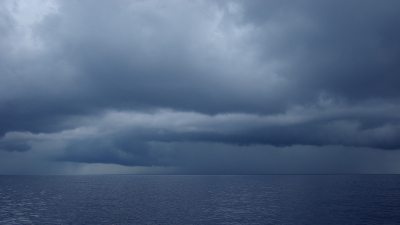- Home
- Discover
- Media Releases
- Media Releases 2023
- ocean circulation
Changing ocean circulation intensifies extreme events in the Indian Ocean

Previously, it was assumed that the tropical rain belt moves south globally when the oceanic circulation in the North Atlantic region weakens. Data and model simulations showed that during such phases, the Northern Hemisphere becomes drier and the Southern Hemisphere wetter. The newly published study shows that this is also accompanied by a strengthening of the precipitation pattern in the Indian Ocean region. Here, East Indian Ocean and Indonesia become wetter, while the West Indian Ocean and East Africa become drier. Increased westerly winds in the tropical Indian Ocean, which transport heat and moisture from west to east, are responsible for this rainfall anomaly.
"We simulated different scenarios in the model, with varying changes in polar ice cover, solar radiation, and greenhouse gas concentrations to better understand the cause and effect of each parameter," said Dr. Mahyar Mohtadi, co-author of the study and head of the Low Latitude Climate Variability group at MARUM. As expected, the results showed a southward shift of the rain belt in the tropics and a weakening of the Hadley cell in the Southern Hemisphere. "The models show that this weakening strengthens westerly winds in the equatorial Indian Ocean, which then provide higher precipitation and water temperatures and enhanced Walker circulation in the eastern Indian Ocean", Mohtadi said. This would lead to more and stronger flood events in the eastern part of the Indian Ocean and droughts and dry spells in the western part of the Indian Ocean.
In the future, the effects of global warming and weakened ocean circulation will compete with each other. "Instead, our study shows that this additional east-west component on a regional scale leads to a mutual amplification of these effects, which may make regions like Southeast Asia even wetter or East Africa even drier than expected," says Dr. Enno Schefuß, co-author of the study and head of the Molecular Paleoclimatology group at MARUM.
MARUM produces fundamental scientific knowledge about the role of the ocean and the ocean floor in the total Earth system. The dynamics of the ocean and the ocean floor significantly impact the entire Earth system through the interaction of geological, physical, biological and chemical processes. These influence both the climate and the global carbon cycle, and create unique biological systems. MARUM is committed to fundamental and unbiased research in the interests of society and the marine environment, and in accordance with the Sustainable Development Goals of the United Nations. It publishes its quality-assured scientific data and makes it publicly available. MARUM informs the public about new discoveries in the marine environment and provides practical knowledge through its dialogue with society. MARUM cooperates with commercial and industrial partners in accordance with its goal of protecting the marine environment.
Xiaojing Du, James M. Russell, Zhengyu Liu, Bette L. Otto-Bliesner, Delia W. Oppo, Mahyar Mohtadi, Chenyu Zhu, Valier V. Galy, Enno Schefuß, Yan Yan, Yair Rosenthal, Nathalie Dubois, Jennifer Arbuszewski, Yu Gao (2023). North Atlantic cooling triggered a zonal mode over the Indian Ocean during Heinrich Stadial 1. Science Advances, DOI: 10.1126/sciadv.add4909
Contact:
PD Dr. Mahyar Mohtadi
MARUM – Center for Marine Environmental Sciences, University of Bremen
Low Latitude Climate Variability
Email: [Bitte aktivieren Sie Javascript]
Phone: +49 421 218 65660
Dr. Enno Schefuß
MARUM – Center for Marine Environmental Sciences, University of Bremen
Molecular Paleoclimatology
Email: [Bitte aktivieren Sie Javascript]
Phone: +49 421 218 65526


